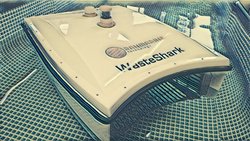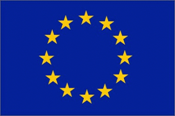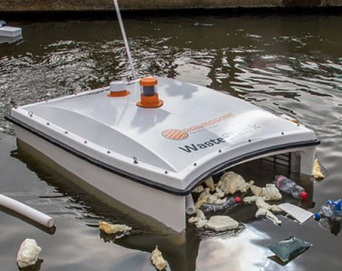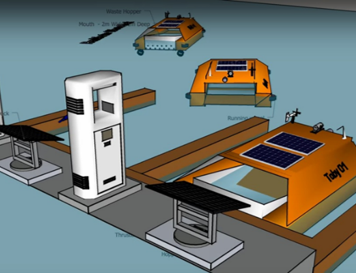WasteShark
An autonomous catamaran to remove floating plastic debris in ports and harbours
The WasteShark is an aquadrone that removes plastics and other floating debris from the water surface. It was designed especially for use in ports and harbors. Shaped like a catamaran, WasteShark can collect up to 350 kg of trash at a time. The electrically propelled drone produces zero carbon emissions and is compact and agile. RanMarine Technology, a dutch start-up, developed the design and prototype through a start-up accelerator programme for port innovators in Rotterdam. DFKI RIC supports RanMarine Technology and EIT Digital partner Nobleo Technology (both from the Netherlands) in the development of an autonomous docking system for the WasteShark within the framework of the EIT funded activity “Autonomous Harbour Cleaning”. The algorithms supplied by DFKI will enable the drone to find it’s way back from the harbour basin to a docking station, where it can deposit the collected trash and re-charge it’s batteries. The autonomous docking capability is an important improvement of the current system and a significant step forward towards a marketable product.
| Duration: | 01.01.2018 till 31.12.2018 |
| Donee: | German Research Center for Artificial Intelligence GmbH & Nobleo Techology |
| Sponsor: | European Union |
| Grant number: | Funded by EIT Digital (Activity number 18181) |
| Partner: |
Nobleo Technology, RanMarine Technoloy |
| Application Field: | Underwater Robotics |
Project details
The WasteShark is an aquadrone that removes plastics and other floating debris from the water surface. It was designed especially for use in ports and harbors. Shaped like a catamaran, WasteShark can collect up to 350 kg of trash at a time. The electrically propelled drone produces zero carbon emissions and is compact and agile. RanMarine Technology developed the design and prototype through a start-up accelerator programme for port innovators in Rotterdam.
DFKI RIC supports RanMarine Technology and Nobleo Technology (both from the Netherlands) in the development of an autonomous docking system for the WasteShark within the framework of the EIT funded activity “Autonomous Harbour Cleaning”.
The algorithms supplied by DFKI will enable the drone to find it’s way back from the harbour basin to a docking station, where it can deposit the collected trash and re-charge it’s batteries.
Robot Specifications
The WasteShark aquadrone has the following technical specifications (source: RanMarine Technology)
- dimension: 190 cm x 140 cm x 45 cm
- weight: 39 kg unloaded
- carrying capacity: 550 litres ~ 350kg
- power source: battery
- thrust: 5.1 kgf (forward), 4.1 kgf (reverse) @ 16V
- on-board sensors: camera, lidar (laser range finder), depth sounder, temperature sensor
- water quality sensors (optional): pH, ORP, conductivity, dissolved oxygen, turbidity, ammonium, chloride, nitrate, salinity, mV, ORP, TDS, Resistivity
- capabilities: 16 hours a day waste collection and/or data collection & transmission
- waste type: plastics, micro-plastics, alien vegetation (e.g. duckweed), floating debris
- operation area: semi-confined water surfaces with ship traffic (e.g. ports, canals)
- steering control: remote control (currently) or autonomous (future)
Autonomous and Eco-Friendly
The autonomous docking capability is an important improvement of the current system and a significant step forward towards a marketable product.
The capability to autonomously return to the docking- and recharging station, once the maximum load capacity is reached, will be implemented in 2018 with algorithms for autonomous path-planning and optical recognition of the docking station entry. The solution is first tested in simulation and then transferred to the WasteShark prototype developed by RanMarine Technology. The prototype is tested in the DFKI Maritime Testing Facility and in port environments in Bremen and Rotterdam.
The final result of the WasteShark development (to be funded by a follow-on activity) will be a system that operates fully autonomous and is able to optimize operation by taking into account the observed and predicted distribution of waste in port basin.




